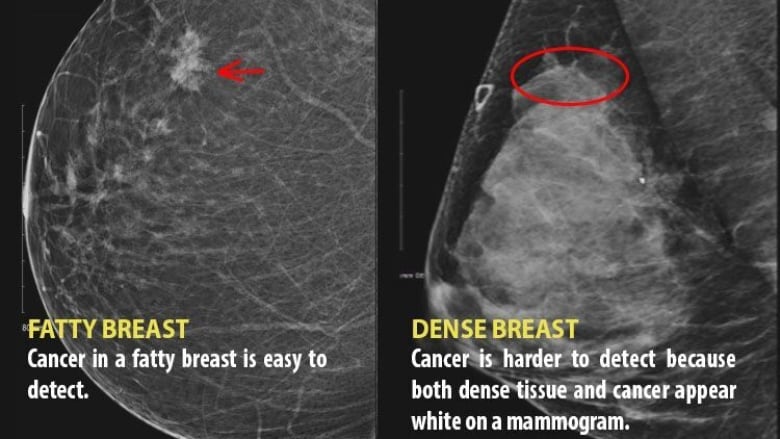Advocates want more cancer screening for those in N.S. with dense breasts
Denser breasts are also a risk factor for breast cancer, according to the U.S. National Cancer Institute

Advocates say they'd like to see more cancer screening in the province for women with dense breasts, but a Nova Scotia doctor says there isn't enough evidence yet to support additional screening.
Breast density is a term that describes the relative amount of glandular tissue, fibrous connective tissue and fatty breast tissue as seen on a mammogram, according to the U.S. National Cancer Institute.
The institute says dense breast tissue has relatively high amounts of glandular tissue and fibrous connective tissue and relatively low amounts of fatty breast tissue.
That can make a mammogram — an X-ray used to screen for cancer — more difficult to interpret because dense breast tissue and abnormal breast changes such as tumours both show up as white areas.
Denser breasts are also a risk factor for breast cancer.
Jennie Dale, executive director of Dense Breasts Canada, said ultrasounds and MRIs can pick up irregularities that a mammogram cannot, and should be a standard for women with dense breasts.
But in Nova Scotia, that's not an option.
"There's just this obstruction that is costing lives and this is essential screening that women with dense breasts need," Dale told CBC's Information Morning Nova Scotia.
"And not only lives, but it's resulting in advanced stage cancer. So it's decreasing the quality of life. That means women are facing mastectomy, they are facing chemotherapy…. Their families are significantly impacted by the trauma."
Elizabeth Shein was diagnosed with breast cancer in 2016 and had a mastectomy. Her follow-up care consisted of a yearly mammogram.
In October 2019, she and other women in the province were informed of their breast density, which is categorized A through D — with C and D being considered dense breasts.
'Nova Scotia is lagging behind'
When she became aware her breasts were in the C category, she had her family doctor request an ultrasound. Her request was refused.
"That really surprised me because I was a breast cancer survivor.… I knew I was at higher risk," said Shein, who lives in Dartmouth.
For her own peace of mind, she started exploring other options and discovered she could get an ultrasound at a private clinic in Toronto.
For her own peace of mind, she now travels there yearly.
"I really believe that Nova Scotia is lagging behind," she said.
But Dr. Siân Iles, a medical advisor for the Nova Scotia Breast Screening Program, said there simply isn't enough evidence yet to support additional screening.
Iles said breast density is a relatively new consideration in a person's overall health.
MRIs available for high-risk patients
She said there are expert opinions, but as of yet, there is no organized population-based breast screening program anywhere in the world that recommends supplemental screening for people with dense breasts.
"It could be beneficial, but we need evidence when we're going to talk about a population-based publicly funded screening tests," said Iles.
"We need good peer reviewed evidence and the reviews of the evidence so far have not come out saying you need to provide supplemental ultrasound screening."
She also noted that Nova Scotia is one of only two provinces that has a high-risk screening program. Patients who are over the age of 30 and have a greater than 25 per cent risk of breast cancer can access mammography and MRI screening.
"Breast density is one of the risk factors that's incorporated into that risk estimate, so having dense breasts, it's very important to know your other risk factors and if you do meet that 25 per cent risk, then you are eligible for a screening program," said Iles.
Dale said Nova Scotia has been a leader in breast cancer screening, noting people over the age of 40 have been able to self-refer themselves for a mammogram for decades.
She said it's time the province steps up and offers additional screening for women with dense breasts.
"It's just a no-brainer," she said.
With files from Information Morning Nova Scotia

